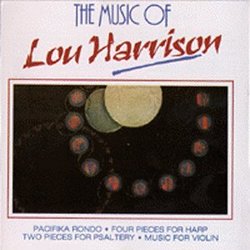A Great Man Passes
Christopher Forbes | Brooklyn,, NY | 02/06/2003
(5 out of 5 stars)
"As I am writing this review arrangements are being made for the cremation and funeral of Lou Harrison, who died over this passed weekend (Feb. 2) on his way to a concert of his music in Ohio. Harrison was a treasure, one of the last remaining mavericks of the early 20th century. He managed to bridge both the experimental and mainstream compositional worlds of the 30s, being a friend of Cage, Partch and Cowell, but also of Virgil Thomson and Copland. This wide ranging eclectism can be found in his work as well as his life. His musical influences range widely, from Rennaissance and Baroque dance forms, through serialism, Americana and most importantly the music of Pacific Rim cultures. Harrison was a life long experimenter, never content to sit in one style or direction. And to the end of his long life he remained a facile, active composer, but always acessible. He will be missed. Judging from the activity on my other reviews of Harrison's work, his passing has generated some new interest in the composer. I am glad of that. His work deserves it. And the present CD is as good a traversal of the composer's work as you can find. Though the four works on the album are diverse, they share Harrison's love of exotic sonority, just intonation and above all meltingly beautiful melody. The major work on the album is Pacifika Rondo. Composed in the 60s for the East/West Center at the University of Hawaii, the work is written for an orchestra of western and eastern instruments. Each movement centers around a specific culture or scene in pan-Pacific culture. Korean, Buddhist, Chinese and Mexican influence are at play in many of the movements. The sixth movement is unique in the piece. Written as a protest against the testing of nuclear weapons in the Pacific, the movement is a furious twelve-tone rant against wanton destruction. What amazes about this piece is that, despite the stylistic diversity, the work hangs together beautifully. Even the "bomb" movement, which is so jarringly different, seems to work in relief to the rest of the piece, and thereby gain more power. The Four Pieces for Harp add other influences to Harrison's pan-pacific mix. The works are often reminicent of troubador music or the clavecin pieces of the French Baroque. They are charming, light works that are thoroughly enjoyable. The second and fourth pieces also include some percussion. The pieces for Psaltery are likewise, occasional pieces and are charming, mixing Chinese and medieval influnces. The final work on the disc is once again more substantial. Music for Violin and Various Instruments combines western instruments with instruments from Asia and Africa into a melange that is greater than the sum of it's parts. The violin part is ecstatically beautiful and the percussion and exotic instruments propel the work to a powerful conclusion.What particularly amazes about Harrison's stylistic mix is that it never sounds gimmicky, as such mixes sound in lesser composers. Harrison often approaches his non-western instruments in a western manner, and his western instruments in a non-western manner. Overarching his instrumental choices is an ear for harmonic combination and intonation systems that is masterful, and a passionate belief in the primacy of melody. This is 20th century music that is both pleasing, powerful and truly beautiful. There is a sense of mystery and magic that is Harrison's own. The product is much more than the sum of it's parts. Performances on this disc are very good. Particularly surprising is the performance by the Oakland Youth Orchestra on Pacifika Rondo. It is wonderful to hear young musicians taking on a work that is so foreign to the language that they are so often immersed in. If I hadn't checked the CD cover for this review, I would have never guessed that this was a youth orchestra, so clean and expert is the performance. The rest of the disc is performed by Harrison experts including the marvelous Willian Boulton on Violin, and Harrison's life partner William Colvig on Chinese instruments. Harrison himself plays the psaltery in the solo music for that instrument. If you are finding yourself intrigued by this marvelous composer, there are many discs out there to choose from. My own particular favorites are the Piano Concerto and La Koro Sutro. If you find you like Harrison, you'll want to own these two discs. As an introduction though, this one is one of the top. It shows off the composer in many of his best moods."


 Track Listings (4) - Disc #1
Track Listings (4) - Disc #1